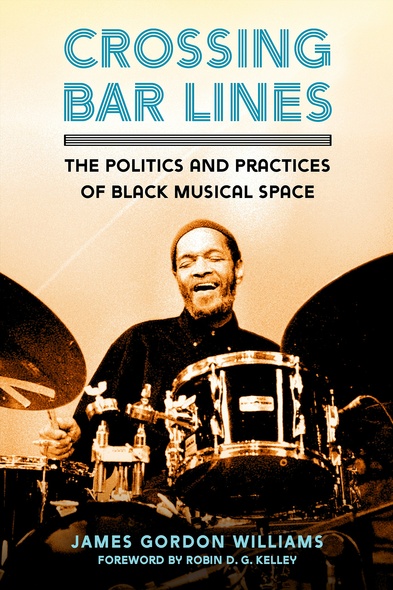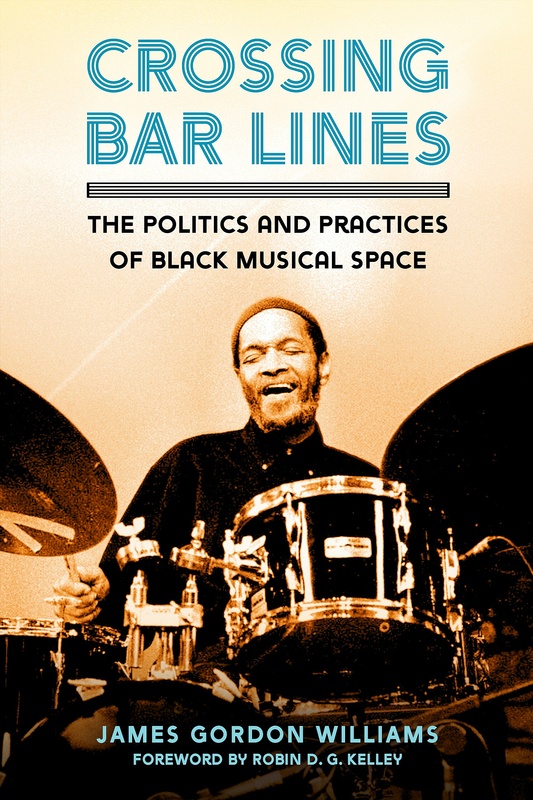
Crossing Bar Lines
The Politics and Practices of Black Musical Space
In Crossing Bar Lines: The Politics and Practices of Black Musical Space James Gordon Williams reframes the nature and purpose of jazz improvisation to illuminate the cultural work being done by five creative musicians between 2005 and 2019. The political thought of five African American improvisers—trumpeters Terence Blanchard and Ambrose Akinmusire, drummers Billy Higgins and Terri Lyne Carrington, and pianist Andrew Hill—is documented through insightful, multilayered case studies that make explicit how these musicians articulate their positionality in broader society.
Informed by Black feminist thought, these case studies unite around the theory of Black musical space that comes from the lived experiences of African Americans as they improvise through daily life. The central argument builds upon the idea of space-making and the geographic imagination in Black Geographies theory. Williams considers how these musicians interface with contemporary social movements like Black Lives Matter, build alternative institutional models that challenge gender imbalance in improvisation culture, and practice improvisation as joyful affirmation of Black value and mobility. Both Terence Blanchard and Ambrose Akinmusire innovate musical strategies to address systemic violence. Billy Higgins’s performance is discussed through the framework of breath to understand his politics of inclusive space. Terri Lyne Carrington confronts patriarchy in jazz culture through her Social Science music project. The work of Andrew Hill is examined through the context of his street theory, revealing his political stance on performance and pedagogy. All readers will be elevated by this innovative and timely book that speaks to issues that continue to shape the lives of African Americans today.
An elegant and theoretically rich book steeped in jazz performance praxis, contemporary musicological research, and Black feminist geography, Crossing Bar Lines highlights how Black lived experience, music-making, and politicized Black place-building have long been entwined in the broader U.S. cultural field . . . . Williams’s book will undoubtedly serve as a rich guide for listeners, musicians, scholars, and critics seeking the space in which to live, to make, and to breathe.
This book is well written, and the musical analyses that are used to bolster the arguments are thorough. At a time when many librarians are actively trying to develop collections to reflect more diverse populations, Crossing Bar Lines is a worthwhile addition to any academic library and is a well suited acquisition for public libraries as well.
The book is itself a courageous, thoughtful, sometimes profound scholarly improvisation. Williams is well versed in jazz and jazz scholarship.
Crossing Bar Lines is an excellent and timely addition to the literature of jazz studies, critical improvisation studies, and Black studies. With his insightful combination of cultural theory and music analysis, along with his engagement with urgent contemporary issues of race and gender, Williams has provided an especially illuminating look at Black musicians as improvisers and as theorists of politics and culture.
In Crossing Bar Lines,James Gordon Williams explores and explains the unifying elements, intentions, concerns, and concepts that permeate musical creations by Terence Blanchard, Billy Higgins, Terri Lyne Carrington, Ambrose Akinmusire, and Andrew Hill. Deftly blending sophisticated music theory with grounded social critique, Williams reveals how Black musical space serves as a rich repository of figures, devices, and practices that affirm and construct a powerful and mutually affirming collective social life in defiance of the social death intended by white supremacy.
How does the atonal, pantonal, autonomist Black musical study that keeps bursting through ‘this thing called jazz’ not only bear the personal expressions and critical interventions of musicians but also the practice of alternative social space from which they and their sound emerges? This is the question James Gordon Williams brilliantly asks and answers in Crossing Bar Lines. His sensitive concern with the other worlds that Black music holds in trust illuminates the ways of that holding. Williams extends to the music and what it bears his own devoted, transformative protection.
In Crossing Bar Lines, scholar and musician James Gordon Williams investigates the ‘space-making performances’ of five contemporary Black improvising musicians, showing the distinct ways they envoice and engage Black humanity in their art. His close attention to the aesthetics of these artists’ politically engaged music will be indispensable to cultural historians interested in the Black radical tradition. At the same time, Williams uses music to produce a valuable framework for thinking about the possibilities of Black radical expression outside of the politics of (racial) representation.
James Gordon Williams is a transdisciplinary musician and scholar in critical improvisation studies and popular music studies. He has collaborated with artists as varied as Joseph Jarman, Gregory Porter, and Fred Moten and performed at jazz festivals around the world. Williams is assistant professor at Syracuse University.





